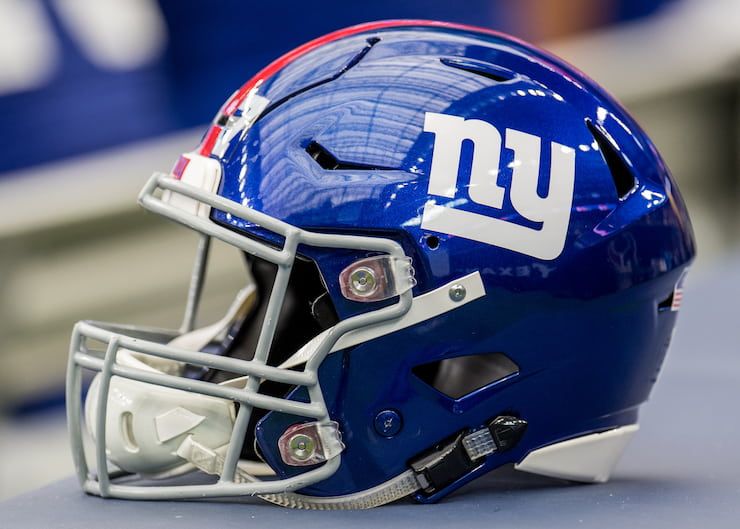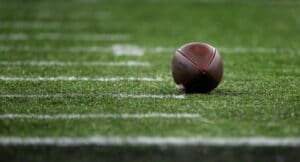What’s in a name? When it comes to the NFL, the first part of any name is fairly obvious in being the city or state that franchise represents. But the origins of a nickname can be far less clear, so let’s explore where all 32 teams derived those tags from.
Arizona Cardinals
The Cardinals’ logo is that of a brightly coloured red bird with which it shares its name, but that is not where the nickname came from. The name was established in 1901 when then-team owner Chris O’Brien described some new jerseys he’d acquired second-hand as “cardinal red”.
Atlanta Falcons
The Falcons were given their name via a contest in 1965 which saw 558 separate nicknames submitted. Several people suggested Falcons and the name was chosen due to the falcon being “proud and dignified with great courage and fight”.
Baltimore Ravens
Baltimore was formally home to the Colts before they left town and in 1995 were replaced by the relocating Cleveland Browns. In a name-the-team contest, fans were given a choice of three nicknames: Americans, Ravens and Marauders. Ravens got 63.4 per cent of the vote in a tribute to Baltimore-born author Edgar Allen Poe.
Buffalo Bills
Formerly called the Bisons, fans were given the chance to rename the team in 1947 with James F. Dyson’s suggestion of Bills getting the nod. Dyson, who pocketed $500 for his winning contribution, got his inspiration from famous Wild West showman, William “Buffalo Bill” Cody.
Carolina Panthers
Taking inspiration from the now-extinct Carolina panther and wanting the team colours to be
black, blue and silver, owner Jerry Richardson’s son Mark settled on the big cat moniker when the city was awarded a team in 1995.
Chicago Bears
One of the NFL’s most historic franchises was originally nicknamed the Staleys before switching to Bears in 1922. Team founder George Halas nearly went with Chicago Cubs, the same name as the city’s baseball team, but settled on the Bears due to football players being bigger than baseball players.
Cincinnati Bengals
Paul Brown, synonymous with fellow Ohio franchise the Cleveland Browns, formed the Bengals in 1965 after three years away from football. In a nod to Cincinnati’s football past, he went with the Bengals nickname, snubbing several other suggestions, including Buckeyes.
Cleveland Browns
Cleveland’s name-the-team contest originally selected the Panthers in 1946. But when a local businessman revealed he owned the right to the name the ‘Cleveland Panthers’ a second vote settled on naming the team after legendary coach Paul Brown, who vetoed the choice initially before relenting.
Dallas Cowboys
Originally named the Steers and then the Rangers, Dallas was forced to change its name from the 1960 season due to the nickname Rangers also being used by a minor league baseball team in Dallas. Without much fanfare, the name was switched overnight to Cowboys by owner Clint Murchison Jr.
Denver Broncos
A founder member of the AFL, the Broncos were given their nickname via a fan-lead contest in 1960. Broncos was the most submitted suggestion, partly due to the success of a baseball team in the 1920s with the same name.
Detroit Lions
After purchasing the then-Portsmouth Spartans in 1934, new team owner George Richards wanted to be consistent with Detroit’s history of having big cat-nicknamed sports teams. With the baseball team called the Detroit Tigers, Richards ultimately picked the Lions.
Green Bay Packers
Green Bay had two nicknames when the club was first formed in 1919, Indians and Packers. Indians came from the team’s sponsors, a meat-packing company Indian Packing, but wasn’t as popular as Packers with the local press. When Acme Packing came on board as a sponsor in 1921, the name Packers made more sense than Indians and stuck
Houston Texans
Houston went through several months of intense nickname research when awarded a franchise in 1999, producing five candidates; Stallions, Bobcats, Texans, Wildcatters and Apollos. In a live tv broadcast, owner Bob McNair made his decision and went with Texans.
Indianapolis Colts
This nomadic franchise has previously been called the Miami Seahawks and Dallas Texans, with a stint in between as the Baltimore Colts. When the team returned to Baltimore in 1953, they brought back the Colts nickname, which was chosen due to a tradition of horse racing in the area. It was decided to stick with the nickname when the team relocated to Indianapolis in 1984.
Jacksonville Jaguars
The football fans of Jacksonville selected the nickname of their team in 1993, two years before the Jaguars made their debut via a contest. From many suggestions, the four finalists were Stingrays, Sharks, Jaguars and Panthers with Jaguars chosen at random.
Kansas City Chiefs
Kansas City mayor H. Roe Bartle, nicknamed ‘The Chief’, helped attract a team to the city in 1963 and in honour of his contribution, team owner Lamar Hunt picked Chiefs from over 1,000 fan suggestions as the franchise’s new nickname
Los Angeles Chargers
Fan Gerald Courtney suggested Chargers as the team’s nickname in a 1960 contest due to fans at the LA Coliseum, the franchise’s first home, shouting ‘charge’ during college games staged at the stadium.
Los Angeles Rams
Wherever the franchise has called home in its 87-year existence, be that Cleveland, St. Louis or Los Angeles, they’ve always had the nickname Rams. It was chosen by the franchise’s first general manager, Damon Wetzel, who was a fan of the Fordham University Rams and copied the nickname.
Las Vegas Raiders
After starting out life as the Oakland Senors following a name the team contest in a local paper, the team pivoted to Raiders after just nine days as the Senors in 1960 following a massive backlash. The famous black and silver colours that complete the franchise’s look were brought in three years later.
Miami Dolphins
A contest to name the new AFL franchise in 1965 attracted nearly 20,000 entries which were whittled down to eight finalists: Mustangs, Moons, Sharks, Dolphins, Suns, Mariners, Missiles and Marauders. Dolphins was the overwhelming favourite with team co-founder Joseph Robbie happy to go with the name due to Dolphins being “one of the fastest and smartest creatures of the sea.”
Minnesota Vikings
The Minnesota Vikings could have been the Chippewas, Miners or Voyageurs when trying to decide on a name in 1960. But Bert Rose, Minnesota’s first general manager, went for Vikings due to the state being the hub of Scandinavian-American culture and the Vikings’ aggressive persona.
New England Patriots
A panel of sportswriters selected the name Patriots from fans’ submissions in 1959. The nickname was considered a good fit, honouring Boston’s role in establishing the United States.
New Orleans Saints
The league announced on November 1, the date of the Christian holiday All-Saints Day, that New Orleans was to receive a team. The date of the announcement, coupled with the team wanting to pay tribute to the city’s Jazz musicians, such as Louis Armstrong, who famously recorded “When the Saints Go Marching In”, made Saints the obvious nickname choice.
New York Giants
Team founder Tim Mara tried to piggyback off the success of the hugely popular baseball team the New York Giants when selecting the name for his NFL franchise in 1925. The baseball team took their name from all the ‘giant’ buildings in the city.
New York Jets
Originally called the Titans, the team changed its name in 1963 when it moved to Shea Stadium, which is located close to LaGuardia Airport. Ownership also liked the name Jets as it rhymed with the baseball team they shared Shea Stadium with, the New York Mets.
Philadelphia Eagles
Starting out life as the Frankford Yellow Jackets, the team moved to Philadelphia in 1933 and picked the nickname Eagles in a nod to President Franklin Roosevelt and the eagle logo used on his administration’s National Recovery Act emblem.
Pittsburgh Steelers
Another franchise that shared its name with a baseball team originally, the Pittsburgh Pirates became the Pittsburgh Steelers in 1940 following a name the team contest. The nickname Steelers was picked by Art Rooney Sr to honour the history of steel production in the region.
San Francisco 49ers
One of a handful of teams to never change their city or nickname, the moniker 49ers was suggested by co-owner Allen E. Sorrell as a tribute to the men who rushed west in search of gold in 1849.
Seattle Seahawks
A contest to name the team was launched in 1975 ahead of Seattle’s debut NFL season and more than 1,700 different nicknames were put forward, including Bigfoots, Rainbirds and Space Needles. Seahawks, proposed by 153 people, was eventually selected by General Manager John Thompson.
Tampa Bay Buccaneers
Tampa Bay’s name-a-team contest produced over 400 suggestions in 1974 but Buccaneers seemed the obvious choice given the historical link between Florida’s western coast and the pirates who frequented the region in the 17th and 18th centuries.
Tennessee Titans
The team kept its Oilers nickname initially when it was relocated from Houston to Tennessee in 1997. But after two seasons as the Tennessee Oilers, owner Bud Adams decided to change the nickname. Pioneers was Adams’ first choice before an advisory board put forward Titans, which served as a nod to Nashville’s nickname of the ‘Athens of the South’.
Washington Commanders
Having been the Washington Redskins for 87 years up until 2020, Washington simply became the Football Team while a 20-month search for a new nickname was conducted. They eventually settled on Commanders in 2022 due to the military connection to the US capital.



